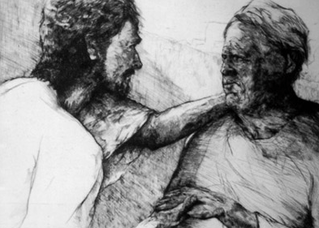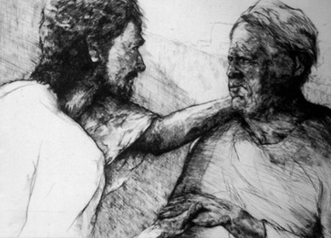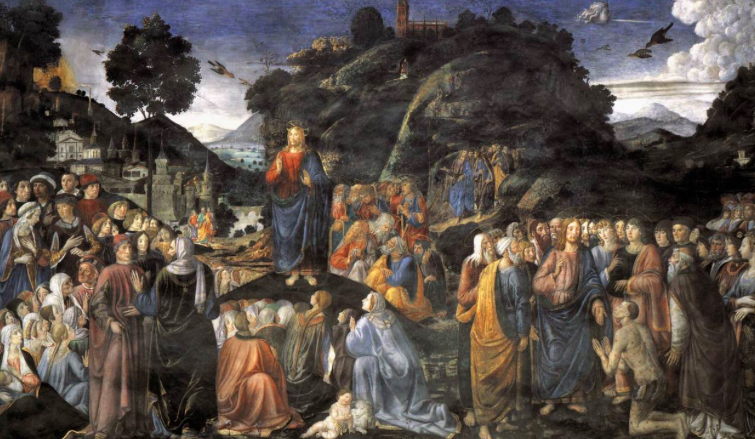 I am jumping ahead a bit in my thread on the Sermon on the Mount, but, there is something very narratively-interesting (yes, I made up a word here) about what story Matthew chooses to come right after, that is, to immediately follow the Sermon on the Mount. He could have picked from dozens of known Jesus-encounters or teachings, but this is the story he choose for us to hear right after the Kingdom-inviting-and-living-righteously-sermon that began at 5:1 and concludes at 7:29. Here is the text of Matthew's post-Sermon on the Mount thread. Afterward, then, please note with me a few narrative inferences that seem very applicable to the church that stands in front of the narrative. (That's us!)
First, note this is purposeful (i.e., a calculated choice by Matthew), for there is a connection to the “crowds” from the the beginning, whom Jesus was ministering to at the start of the Sermon (4:23-5:2). This is Matthew's way of connecting the Sermon to the encounter Jesus will have at the head of chapter 8. The reader is not to disconnect the Sermon on the Mount to this following event, thus leaving the reader to ask, what is the significance of the leper in this narrative to what we just heard from Jesus on that mountain? Second, Jesus had just made an invitation into his kingdom and explained what righteousness was, not only required in this kingdom, but was, also, to flow from living out the kingdom and his first encounter is a leper. This, of all people in the land, is certainly one of the target groups of the Beatitudes (poor in spirit, mournful, meek/powerless), a much marginalized social class, and very unclean. Third, note that Jesus touched the leper before he healed him—significant, because you don’t touch lepers and if you do, you share in their uncleanness (get it?). Then, finally note, the kingdom is realized when “immediately” the leper was made clean. You must remember that pure of heart in 5:8 is actually [socially, religiously] “clean of heart.” So there is a definite narrative pun (connection) here for the reader to catch. This narrative was no interruption, but was the sermon's application. Now go and do likewise.
0 Comments
Think about this: In Mark 1:40-45, Jesus touches the leper BEFORE he makes him clean. This order is everything—and it is instructive to us as church. Typically, both as individuals and as church (and I mainly want church to hear this), we welcome others into our circle of affections after they are clean first—then we touch (welcome, embrace). Here in Mark 1, Jesus is approached by a leper and touches him and then he makes him clean. Everyone else saw a leper; Jesus saw a human being. This is church, people. We welcome others into our circle of affections and care and embrace before we judge or evaluate them. We see human beings, made in the image of God, first. This order is everything. This is the gospel. This is church. And, if we want to have people freely talk about us (our church) and the news of our gospel to spread, this order is everything—and then we will see people coming to Jesus from “every quarter,” every neighborhood.
 While Christians are lulled into the gladness and glitter of this highly commercialized and consumer-oriented season, not a day goes by without a wave of human tragedy crashing in on our souls, whether personally or through talking-head news, social media, or on the front pages of our news rags. Yet, we persist in counting this season as one of joy and good cheer Furthermore, we take our annual offense at church outsiders for taking the "Merry Christmas" out of our sacred season. Nonetheless, Christians underestimate our unbelieving and unchurched neighbors and friends. We dismiss the possibility that, in their own way, they might actually be seriously seeking answers—ultimate answers—about life, death, faith, and God. Often, however, it is our particular version of Christianity that has been rejected or held in suspicion, not the biblical one presented in the pages of our New Testament. Sociologist and Christian author Os Guinness writes that to the believer Christianity “was once life’s central mysteries, its worship life’s most awesome experience, its faith life’s broadest canopy of meaning . . .” But, today, he laments, no matter how passionate or committed an individual believer may be, Christianity often amounts to little more than a private preference, a spare time hobby. Such a faith and church experience is insufficient for our time—insufficient for our unbelieving neighbors. Our modern version of Christianity and, in particular at this time of the year, the contemporary Hallmark Card version of the Christmas story, is significant when we consider how non-believers view the church and its message. For serious seekers, such spare-time faith is not a solution to their deepest needs. Christianity must be more than a cozy warm blanket; something more ultimate to raise one up above one’s immediate and very felt needs. Amid the glad tidings often associated with the Christmas story is an oft-missed dose of “reality” etched into the biblical scene. The original story of the Savior's birth was accompanied, grievously, by the slaughter of innocent children. “Then when Herod saw that he had been tricked by the magi, he became very enraged, and sent and slew all the male children who were in Bethlehem and all its vicinity, from two years old and under, according to the time which he had determined from the magi” (Matt 2:16). Along with shouts of exultation from shepherds, homage from the Magi, and angels praising God, there is another voice we need to hear:
These are strange words coming in the midst of this joyous occasion we call Christmas. Yet, they must be heard, a reminder that lament and despair grip the human experience. The first time we meet this Old Testament character, Rachel, is at that delightful moment when she thought she would be marrying the love of her life, the young patriarch Jacob. But the story turns quickly to despair: Rachel’s father deceives Jacob into first marrying Leah, her older sister. Then, as the story continues, to make matters worse, Leah has eight sons as Rachel remained childless and we hear her wail the depths of her barrenness. God eventually takes Rachel’s reproach away by giving her a son, Joseph, Israel’s future deliverer. But, while giving birth to her second son she hears news that Joseph, her first-born, had been murdered. Upon receiving this news, “Rachel began to give birth and had great difficulty.” Then, reflecting on her anguish she names her newest born son “trouble” (Benjamin) and she dies and is buried by the roadside on the way to Bethlehem. (Yes, that's right, Bethlehem. See the Christmas connection!). Rachel’s story, as well as the original Christmas story, is surrounded by the swing between suffering and gladness, between despair and hope. The very realities of life.
The gospel story is pictured in Rachel’s cry, that is, of God’s Son ending up on a cross, rejected, and dying the cruelest of deaths. The reality of life, its pain and often unfairness, demand that one must turn to the God of Golgotha, who alone can provide the relief, the comfort, not simply mere sentimentalism or “spare-time” religious experiences. No other hope except God’s work in Christ can penetrate our neighbor’s deepest hurts or pierce their loneliest moments, or lift them above their needs. Amid the tinsel and cheerfully wrapped presents, let us remember Christ’s birth wasn’t to increase retail, but to bring good news that would meet the deepest needs and light the darkest space of the human experience. Our unbelieving, skeptical friends and neighbors deserve no less. And in this, they might find the real Christianity they need and the hope they long for.
 It is understandable that suburban, exurban, and affluent church congregations, typically, do not see the link between the gospel and the flourishing of their neighborhood. Here’s the problem: Which neighborhood? Whose neighborhood? And, O by the way, our neighborhoods by definition are flourishing. Suburban and exurban congregations tend to be a mix of like-minded, demographically related, geographically similar people who travel various distances away from their own neighborhoods to a building in an incongruent neighborhood (to most of the congregation), the place of gathered, weekly worship—the building they call “our church.” This is the habitus of Christians within suburban congregations each week. A habit that teaches, forms, and qualifies an understanding of the gospel. The neighborhood is a space we leave for church, more a concept of social structure rather than a concrete place or association; a place where my house is located, but detached from my church experience and faith. This offers a building-centered church experience that more easily relates to the command to love the Lord your God, but has no real, concrete relationship to love your neighbor(s) as yourself. In a real way, a suburban church congregation is without a neighborhood—at least without a specific one. There is no neighborhood for the church to ultimately be identified with, for the members are mostly transported from their actual neighbors and family in real neighborhoods to a one-size-fits-all neighborhood that is stuffed inside a building. Rather than a public faith that engages a neighborhood, practicing the second-which-is-like-unto-the-first-command to love one’s neighbor, more affluent and suburban/exurban congregations form a more privatized, truncated, thin faith (i.e., Christian experience) and, as a result, there is a bent toward more cognitive (knowledge-based) and behavioral outputs (i.e., activities) and outcomes. Thus, the church, the gospel, and discipleship are all aligned with a neighborhood-less social grouping, separated from the day to day realities of life in a neighborhood. Unexpectedly, the early church grew, not because they verbally witnessed, had an outreach program, or held bible studies; but, because they lived their daily lives in contrast to the world around them—their habits were different and their habits were noticed by their neighbors. And, not just in cultured, acceptable behavioral ways, but in concrete, intentional actions. Their discipleship included helping the poor, rescuing exposed (abandoned, thrown away) babies, adopting orphaned children, rescuing prostitutes (temple slavery), and meeting the needs of the widows (who were the most vulnerable and under-resourced population in the empire). This is how the body of Christ, the church, grew. The presence of Jesus was experienced in concrete intentional action through the church—practicing the presence of Christ amid neighbors. Typically for the non-urban churches, evangelism and mission is understood, not by kingdom righteousness, advocacy for injustice, and social action on behalf of a neighborhood, but by numbers of people funneled into a building for a worship service, a bible study, or special fellowship event—a head count of conversions or transfer growth. Church leadership institutes activities and behaviors to draw the unchurched out (and away) from their neighborhood (without actually going into those neighborhoods) and into the building (they call church), which is neighborhood-less (or at least in a neighborhood that is not their own). When the liminality of church life is separated from the daily life of a neighborhood, the gospel and its associated outputs (i.e., activities) and outcomes are disconnected from the life of their neighbors. When one’s own neighborhood consists of those who have had the privilege of flourishing and a church congregation is detached from a neighborhood, the Christian experience affirms a gospel unrelated to the flourishing of a neighborhood. Christian behaviors, then, are limited to relationships and social associations that affirm “traditional” cultural values (within that building) rather than including behaviors that understand the dynamic relationship between structures, systems, and people’s well-being within the context of a neighborhood. The gospel of the suburban church is a limited, one dimensional gospel. A one-dimensional gospel indicates solely a person/God dynamic relationship; whereas a multi-dimensional gospel includes the person/God dynamic and, also, creation/God, person/creation, and person/person. The habits of the suburban and exurban church makes it difficult to see the link between the gospel and the flourishing of a neighborhood.  For a more comprehensive study on the relationship between the gospel and social action, please take the time to read through my Wasted Evangelism, an exegetical commentary on Mark's Gospel. I am also working on another volume on Church Growth from an exegetical study in Ephesians, hopefully titled, Not (just) By the Numbers: Getting Beyond Building-Centered Church Growth in Search of Other Biblical Outcomes—a Thesis on Biblical Temple-Church Growth; see some posts related to these studies (evangelism and Not by the Numbers).
Read the chapter in my Wasted Evangelism: Social Action and the Church’s Task of Evangelism: “A Prelude to Judgment (Mark 3:20-35): The Beelzebul Episode and Its Significance for Evangelistic Social Action”
|
AuthorChip M. Anderson, advocate for biblical social action; pastor of an urban church plant in the Hill neighborhood of New Haven, CT; husband, father, author, former Greek & NT professor; and, 19 years involved with social action. Archives
February 2024
Categories
All
|
Pages |
More Pages |
|


 RSS Feed
RSS Feed